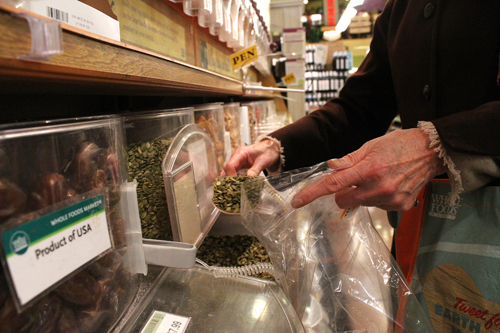Bulk bins: the cheaper and more environmentally friendly way to shop. A Portland State study now has the data to officially support this claim. In the first research of its kind in the United States, a team of four PSU Master of Business Administration students conducted a study on the cost and environmental benefits of shopping from the bulk bins. According to their study, students found that consumers can save an average of 89 percent by buying in bulk instead of food in pre-packaged counterparts.
Portland State MBA students research bulk bins

Bulk bins: the cheaper and more environmentally friendly way to shop. A Portland State study now has the data to officially support this claim. In the first research of its kind in the United States, a team of four PSU Master of Business Administration students conducted a study on the cost and environmental benefits of shopping from the bulk bins. According to their study, students found that consumers can save an average of 89 percent by buying in bulk instead of food in pre-packaged counterparts.
Funded by the Bulk is Green Council in cooperation with the PSU Food Industry Leadership Center and the School of Business Administration, MBA candidates spent months meticulously researching bulk bin prices and environmental efficiency. They found that bulk bins can save shoppers as much as 300 percent in certain categories of food, especially “coffee and tea” and “spices,” with savings in every category except in “nuts and seeds” and “snacks and misc.”
Anna Abatzoglou, one of the MBA students working on the research, explained that consumers know there is savings in bulk bins but that there is a lot of data out there with unclear sources and authority to back it up, since there haven’t been any studies done on bulk-bin shopping. “This is the first official study of its kind to be done in the U.S.,” Abatzoglou said.
Ashley Sherrick, director of the Bulk is Now Council added that “this is monumental for PSU. Lots of people don’t know about the tangible environmental and economic benefits of bulk foods.” Although the project was funded by the Bulk is Green Council, the council did not have control over the study’s design or execution.
The seeds of the project began overseas, where Abatzoglou and Cindy Schulte, another member of the research team, were studying abroad. They became acquainted with professor Tom Gillpatrick of the School of Business Administration, who asked them to head the research as part of their MBA capstone project. They were both very enthusiastic for the chance to do the research.
Schulte explained that “part of what drew me to the PSU MBA program was the capstone and the chance to do something so hands on.” When asked how much time they spent on the project, she laughed and said: “We added the hours up once, and it was a lot, somewhere in the hundreds. We had no idea how much work it would end up being, but it was a really cool opportunity. It really proves that there are both economic and environmental benefits associated with bulk foods.”
Over the course of several months, the team visited local grocery stores and co-ops all over the Portland metropolitan area, dividing bulk foods into several categories, such as beans, nuts and seeds, and spices. They calculated the savings by their unit price as well as attempted to measure the environmental benefit by weighing the packaging.
“In some of the categories, the savings is huge,” Abatzoglou said. When asked if their findings had changed her shopping habits, she said, “I’m only going to buy spices in bulk; it not only saves money, but space in the cupboard.”
In fact, the only category of foods without a clear economic benefit to consumers was nuts and seeds, which are actually slightly more expensive when purchased in bulk. “That was probably the biggest surprise,” Abatzoglou said. She explained that “it’s because that’s what a lot of people are buying.”
Still, there are some consumer concerns about the bulk bins. Abatzoglou said the biggest worries are freshness and sanitation. “Many stores with bulk bins don’t label the expiration or refill dates. That’s one of the suggestions we made to the Bulk is Green council, and stores are doing it, it’s just not consistent yet,” Abatzoglou added.
The study’s high-level findings can be found on the Bulk is Green website, bulkisgreen.org.





short lecture notes for business sciences,management,mba,bba and commerce students